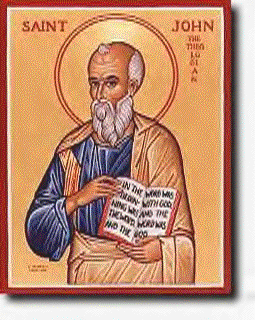THE GOSPEL OF JOHN
and the S-word of Truth
by John Bailey 
In tackling the significance of Johns gospel,
we are going to discuss here
the importance of the Word.
We are certainly told
how important this word is
at the very beginning of the Gospel.
The Word can be viewed at many levels,
the highest of which is the
Logos of Christ Consciousness.
This highest Word is a light,
which illumines all the
darkest corners of our mind:
The Light which casts no shadow.
It is the principle of order.
And it is embodied in Jesus so that
those of us who have internal confusion
may have this reference of a being
who has defeated all of His internal chaos,
and also so that we have the
spoken word of a Master to save us
from our own internal chaos.
How many of us have
this internal clarity?
How many of us have a mind
in which there is no shadow?
A word is a principle of order.
Some people say,
"why is it important that I understand
the meaning of the words that I use?
Why not just talk and get on with it?
Why use that word,
when this one is so much easier?"
Preconceived, unexamined definitions of words
are not only very limiting,
but dark corners in consciousness.
By understanding what we say,
by making our vocabulary active,
we begin to free ourselves from the dominion
of our own inadequate definitions.
The understanding of words
is a method of awakening.
What better way to approach
an understanding of ourselves
than the way of understanding
what we are talking about,
both in communication
with those external to us,
and in the internal dialogue
that we hold with ourselves?
It has been said that,
"the pen is mightier than the sword."
Pens have been utilised to pen sheep,
and to penalise, and to put into penitentiaries
those who do not subscribe to man-made laws.
This saying can be used very powerfully by
those who feel that capital punishment is not
the best method of dealing with the criminal element.
When we are pensive,
we are locked in the head,
in our thinking life
- separated from our feeling life,
and not open to new stimuli.
It can also be said that
"the sword is mightier than the pen."
That is, the S-word or spirit word
is mightier than the pen.
Ephesians|6:17
"The sword of the Spirit,
which is the word of God:"
A go'spel is a God Spell.
It is the word of God, spelled out;
a spell being a tale or recital.

There are four gospels in the New Testament.
The first three Matthew, Mark and Luke,
are commonly referred to
as the synoptic gospels,
which are a view of
the life of Christ from the outside.
The tales of His works of wonder,
the words He spoke,
and descriptions of
His life and travels.
The Gospel of John supplies us with
a completely different approach.
It gives us the inside story.
It is a spiritual handbook.
Reading and re-reading of this book,
continually working to comprehend
the meaning of the words,
using a good etymological dictionary,
is a road recommended for Self-discovery.
Johns gospel was written
by a very intelligent man,
whose words indicate an enlightened being.
No words used in this gospel
are unnecessary or wasted,
And by finding inside ourselves
the meaning of the words used,
and by act of Will attaching importance to them,
these words become the beginning
of an ordering process in us.
Each of the sayings of Christ
in any of these Gospels
can be taken out of context
and treated as Universal Truth.
Mastery of the definition of words
provides us with a powerful,
active vocabulary.
On the outside, it delivers us from
the ambushes and bushwackings
of those who would lead us off the path
of the search for our root cause,
and who would tie us up
in the twiggery of earthly life.
By analysing the words that they use,
we can say, "to whom goes the benefit?"
The more subtle ambush comes from within;
from the hidden persuaders
that continue to influence us.
Our past unassimilated experiences
that resonate in our being and
engram themselves deeper and deeper
into our psyche.
Stuff that weve not yet dealt with,
through fear, social conditioning, etc.
These forms remain unclear
and so are difficult to deal with.
Johns Gospel, understood and embodied,
gives us inner illumination and an
internal form that even death cannot corrupt.
Johns Gospel starts with:
~~~~~~~~~~~~~~~~~~~~~~~~~~
"In the beginning was the Word,
and the Word was with God,
and the Word was God.
The same was in the beginning with God.
All things were made by him;
and without him was not
anything made that was made."
~~~~~~~~~~~~~~~~~~~~~~~~~~
These are the first three verses of
the King James Version
And yet already we are presented with
what appears to be a very difficult proposition,
and on first observation very confusing.
How can the Word be
WITH God and still BE God?
The first implies separation,
whilst the second affirms non-duality.
The original Greek is slightly different.
~~~~~~~~~~~~~~~~~~~~~~~~~~
"In the beginning was the Word,
and the Word was with the God,
and God was the Word.
This one was in the beginning with the God.
All things through him were generated,
and without him was generated not
one thing which has been generated."
~~~~~~~~~~~~~~~~~~~~~~~~~~
In the beginning.
The beginning has the word 'gin'.
And gin is closely associated with 'gyn',
the female productive organ,
the organ which houses,
nurtures and extrudes.
Generating is female and
has to do with begetting or producing.
In this generative principle, was the Word.
In the Greek, to put 'the' before the word God
makes 'the' God more important
than God without 'the'.
Without 'the' before it,
God is merely 'a' god.
And so, what is 'a' God,
and what is 'the' God?
'The' God described here
is the Absolute Sentient Power;
the Godhead, from which,
and of which, all is created.
The ineffable, the unlimited,
the beyond-BEing.
This power cannot be described
because all description demands circumscription.
Anything described is defined
and therefore limited.
And this is why in the Jewish tradition,
even the name of God is not uttered.
We can only talk of the qualities of the Godhead.
And each of these qualities
is not an exhaustive definition:
and neither does it encompass the Infinite
Absolute Sentient Power is infinite.
We cannot, with our finite mind,
comprehend infinity.
What is God? God is Spirit.
What is Spirit? Spirit is Power.
What is Power? Power is the cause
of all that we think, feel and do. 
~~~~~~~~~~~~~~~~~~~~~~~~
If you are reading this on paper,
visualise all the words that you read
as being The Word.
Visualise the edges of the paper
on which these words are printed
as extending to infinity.
Visualise other pieces of infinite paper
on top of and below this one,
and another one on top and another below,
and more to infinity.
The white paper now represents
the Absolute Sentient Power.
Take the words away,
and the paper is ever here, now.
The words only exist because
they are of, and from,
this white paper.
To continue with the example,
the ink would be produced
of and from the paper.
The shape of the letters are
of and from the paper.
the ideas involved in the words
are of and from the paper,
And the feelings that we experience
while reading them are
of and from the white paper.
In this Infinite Field of white paper
is the finite field of The Word.
No matter how great the number
of created forms there are,
these forms are ever within
The God, within The Power,
of and from which they have their being..
And this Word is 'a' God.
God is good and any good is 'a' god.
The Father, the generative power,
is moving towards a centre
to create this Logos God.
A god must have the same constituent qualities
as the Absolute Sentient Power Godhead.
It ideates:
it formulates.
It acts as cause:
it impinges upon and induces
changes within its parts.
And it has sentience:
it feels the results of change.
This is precisely the definition of a person,
and therefore we have to say that
as this Word is established
in this three-fold way,
it is legitimate to call it 'a' God.
When the fourth gospel begins with the statement,
In the beginning was the word,
the word translated as the 'Word' in English,
is in the original Greek the word Logos,
which means ratio, rational formulation,
ground of our true reason or logic.'
Then we can say in relation to this
that order in our lives depends upon word.
We cannot think without words.
If we cannot think,
then we cannot order our lives.
If we cannot order our lives
then we live at the beck and call
of whatever environing influences require from us.
W-ord, the principle of order.
"In the beginning was the Word,
and the Word was with the God,
and God was the Word.
This one was in the beginning
with the God.
All things through him were generated,
and without him was generated
not one thing which has been generated."
And the Word became flesh in the Christ Logos.
Which word proceeded to inform and enliven us
with the S-word, with the Word of spirit..
When we partake of this S-word,
the light and life in
the spirit words that Christ spoke,
- let it become us, and we be it -
then we enter that state
of Christ consciousness
that our Infinite Father has prepared for us.
We become that prodigal son who re-pen-ts.
We re-consider our relationship with the Father,
and rejoice with Him
in consummate joy at our reunion.
~~~~~~~~~~~~~~~~~~~~~~~~~~~
The following is from the works of Eugene Halliday:
'If you love me, do as I say,' says Jesus,
the incarnate Logos, the Ratio of all Reality.
He is saying:
If you love Logologic, do as Logologic says.
This is the short way into life.
Logos is the totality of all conceivables,
held in perfect balance,
the totality of all polar opposites
resolved in mutual affirmation.
Affirm - all things as they happen,
simultaneously with whatever of reality
the things present of themselves
- and their opposites.
Shine the light of consciousness equally
on the righteous and unrighteous,
the good and the bad, life and anti-life.
Reality is an ocean of fish;
if there were no sharks
there would be no fast swimmers
'The worst is as good as the best,' says Boehme.
'Opposition is true friendship,' says Blake.
'La ilaha illa llah,' say the Muslims.
'Only the Infinite Continuum of Sentient Power IS,'
says Yadillah.
~~~~~~~~~~~~~~~~~~~~~~~~~~~~~~~~
Good Fortune to Omar on this lovely site.
And Love and Peace to all,
John.
John Bailey has studied with the
'International Hermeneutical Society'
over twenty-eight years -
A society which imports the three principles of:
1. The Love of God
2. The Dignity and Brotherhood of Man
3. The Responsibility of the Individual
Click here to send an email to John Bailey 
|  | The Inner&Outer Ministries |

